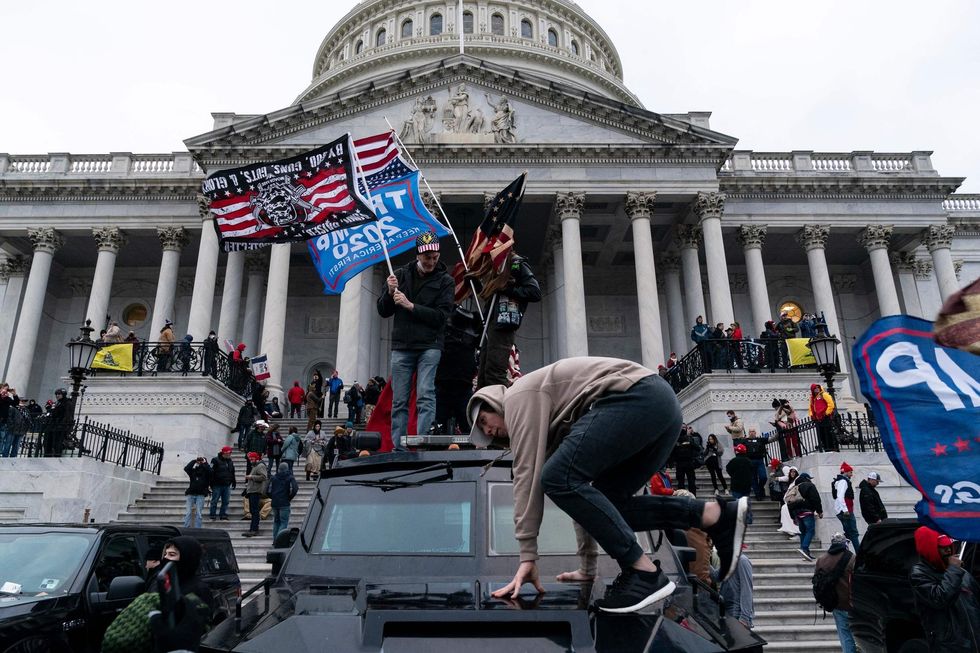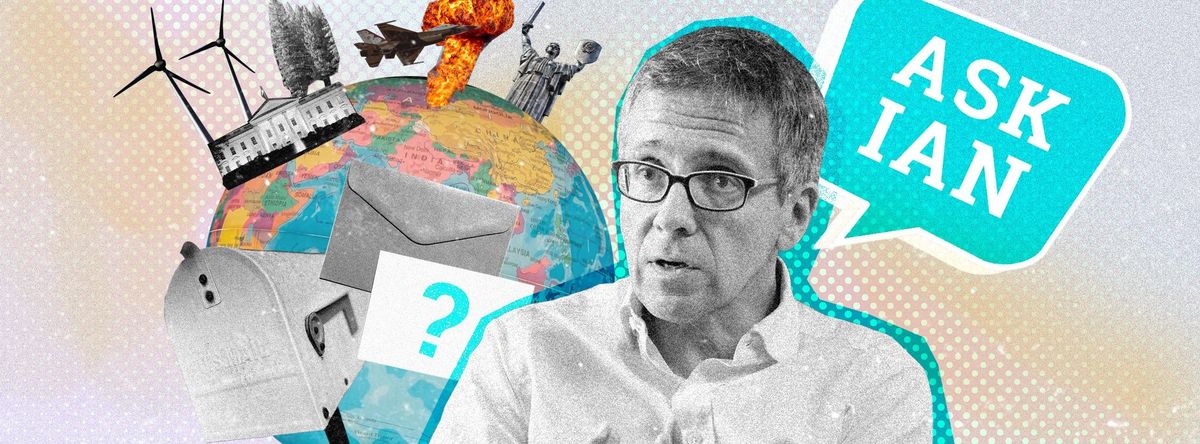Happy Friday, everyone!
It’s still summer so you know what that means…
You ask, I answer.
Note: This is the third installment of a five-part summer mailbag series responding to reader questions. You can find the first part here, the second part here, and the fourth part here. Some of the questions that follow have been slightly edited for clarity. If you have questions you want answered, ask them in the comments section below or follow me on Facebook, Twitter, and LinkedIn and look out for future AMAs.
 Trump supporters protest outside the US Capitol on January 6, 2021.Alex Edelman/AFP via Getty Images
Trump supporters protest outside the US Capitol on January 6, 2021.Alex Edelman/AFP via Getty Images
Want to understand the world a little better? Subscribe to GZERO Daily by Ian Bremmer for free and get new posts delivered to your inbox every week.
Are Barbara Walter's fears about a civil war in the United States overblown? (Logan B)
For now, they are. In large part because the military and judiciary remain politically independent and committed to upholding the rule of law. But people shouldn’t believe “this can’t happen here.” The U.S. is by far the most politically divided and dysfunctionalof advanced industrial democracies, and it’s hard to be optimistic about the trajectory over the coming years. The 2020 election and its aftermath—Jan. 6, a delegitimized national election, a historically divided country—evidently was not a big enough crisis to bring about structural change to address the dysfunction in the country. Americans are more polarized than ever, and a recent SPLC study found domestic support for "participating in a political revolution even if it is violent in its ends" is historically high among young people—roughly 40% across the political spectrum. I’ve grown increasingly concerned that the 2024 election will bring unprecedented political violence on both sides of the aisle and risk a constitutional crisis, irrespective of who wins them.
What are the greatest opportunities for the United States right now?(Joe B)
The U.S. has the most favorable demographics of any major economy, the most entrepreneurial and dynamic economy, the best universities, unrivaled innovation clusters, and deep capital markets. We are at the global frontier of science and technology. As such, the U.S. is the best placed nation to lead the way in developing solutions for the world’s most pressing challenges (pandemics, climate change, poverty, etc.). Yet our rates of innovation and social mobility have been slowing for the last half century. We need to invest more in research and development for basic science and technology, expand access to higher education, and increase skilled immigration. Only then will we be able to live up to our full potential.
How do we reconcile economic development with environmental pressures? Can we enrich the poor of our planet without destroying whatever ecological balance there might be? (Jeffrey D)
We can, but not as quickly as we may like to. It’s true that globalization and the creation of a global middle class came at an enormous cost for the climate. That’s now changing as economic growth becomes more and more decoupled from CO2 emissions… but the change is too slow to avoid enormous ecological damage (as we increasingly see every day). Longer term, though, we are heading toward a world of inexpensive and sustainable energy—which is incredible to think about. Add to that more sustainable population dynamics (rather than the population “bomb” we feared in the 70s), and there’s reason for real hope.
Do you think that it is possible for the international community to stop CO2 emissions in time to avoid +2.5ºC global warming? (Ana C)
Not given present trends in nationalism. By revealed preference, it’s clear that too many people in industrialized countries believe foreigners—especially those who don’t look like them—aren’t really people. That means there’s an absence of resource transfers from rich to poor countries for climate mitigation and adaptation, which all but guarantees we won’t get the kind of sustainable transformation we need from India and other developing countries—countries that aren’t responsible for getting us to 1.2ºC but which will comprise the lion’s share of emissions from 2ºC to 2.5ºC.
Do you foresee massive sovereign defaults coming? (Rishon B)
In developing countries, yes. High indebtedness, rising interest rates, and stronger political demands from angry populations on the back of the pandemic and the fallout from the Russian invasion of Ukraine have created unsustainable fiscal environments. We’ve seen this boil over in Sri Lanka already. Even bigger developing countries are going to experience similar episodes over the coming few years.
How long before we will stop using fiat currencies? (Davide L)
I can’t see it happening in the next 10 years, for several reasons I discussed here. But the world is changing quickly. Are national governments going to be the most powerful actors in the world in a generation? Probably. But not necessarily. If that fundamentally changes, fiat currencies could be under threat faster than people think.
What do you think of the Biden administration's Latin America strategy? Do you think the United States is paying close enough attention to its own backyard? (Paul V)
Well, it’s not much of a strategy, really. There’s no political pathway for a domestic compromise on immigration, which puts enormous strain on Mexico and Northern Triangle countries. Plus, there’s a number of “rogue regimes” the Americans don’t want to talk to (Venezuela, Cuba), which causes frictions with others that are more ideologically aligned (Mexico, Argentina). And U.S. public sector investment in and aid to Latin America remains too limited to move the needle. It’s probably been the most significant hole in foreign policy for the Biden administration.
Is there a banking crisis in China? (Gary H)
There’s no national crisis at this point, though some rural banks have gone under. The Chinese government has proven itself able and willing to patch problems with fiscal support whenever necessary, and I don’t see that changing in the near term. The catch is that support is only a band-aid. It prevents crisis now by creating bigger economic bubbles and postponing the pain of adjustment down the road, both for individual savers and for corporates. Eventually, though, something’s got to give.
We seem to be at a tipping point all over the world with the rise of authoritarians: Trumpists in the U.S., Bolsonaro, Erdogan, Putin, Orban, Xi Jinping. Do you think the trend will stick and maybe even get more pervasive and entrenched, or do you think this is a temporary phenomenon and we'll swing back toward more democratically led countries?(Donna R)
There are a couple of big exceptions to that trend—namely, an increasingly powerful and cohesive European Union and consolidated democracies in Japan and Germany, the world’s third and fourth largest economies. But yes, overall this is a challenge and one that’s likely to get worse before it gets better given slowing global economic growth and growing inequality both within and between countries.
Are tech companies a bigger geopolitical force than countries? Will they become such a force in the future? (Natan K)
In the digital space, they are. After Jan. 6, while Congress, the courts, or law enforcement were powerless to respond, Big Tech swiftly and unilaterally de-platformed Trump. When Russian hackers attacked U.S. government agencies and hundreds of private companies back in 2020, it was Microsoft, not the NSA or the U.S. Cyber Command, that identified and neutralized the threat. As I wrote here, tech companies were able to do these things because they own and control a growing share of the infrastructure that societies, economies, and governments worldwide run on. And as more and more activities to the digital space, their ability to exert geopolitical power will only grow.
If the Ukraine war fragments the global system into relatively isolated spheres of influence, will the West have even less leverage over Russia in the future? What does that portend? (Gautam J)
The opposite is happening so far. The West is becoming stronger, more focused, and more aligned. NATO is expanding and has a newfound sense of purpose. Europe is becoming more integrated, and even the Poles and Hungarians are more engaged. Relations between the EU and the United Kingdom have improved. America has regained credibility and leadership on the global stage. And Japan, South Korea, Australia, and New Zealand have been brought into alignment with the U.S. and Europe, paving the way for a much more global security architecture. All of these developments give the West more, not less, leverage over Russia (and China). No, Russia isn’t about to become North Korea—its natural resources are too important to keep off the global market, and developing countries including China and India will continue to do business with it. But that just means Russia will survive, not that it will thrive. The fact is that most of Russia’s economic potential—from advanced manufacturing to skilled human capital—was heavily dependent on integration with the Western-dominated global economy. The same cannot be said of the West, for whom Russia barely figured as an economic partner. By the end of next year, Europe will have rid itself of its reliance on Russian energy entirely (one of the last remaining points of Russian leverage), while Russia will be starved of critical components, talented workers, economic growth, and global influence.
Best sandwich bread? And what sandwich do you think of when you think of this bread? (@Ya_Boy-yay)
An English muffin. Because a spicy breakfast sandwich with a runny egg after a heavy morning workout is the best sandwich.
Would Moose run for President in 2024? (Victor V)
He really should. The great thing is—at 16—he’ll finally be age appropriate against Trump and Biden. I would be concerned about his genocidal tendencies against squirrels.
 The 47th President of the United States?
The 47th President of the United States?
If the war in Ukraine ends in a Ukrainian victory and borders are returned to either their pre-February 23 state or their pre-2014 state, what's next for Russia? (George H)
I suspect this isn’t going to happen (however much I want it to), but that would actually be a better outcome for Russia in the long run than a victory on the ground followed by annexation or a drawn-out stalemate, because it’s the only way I could see the country eventually re-joining the G7 and the global economy. As long as it continues to illegally occupy Ukrainian territory, Russia will remain effectively cut off from the West, and ordinary Russians will pay the price.
If Biden doesn’t run, who do you think should for the Dems? (Karim T)
Forget about what if Biden doesn’t run. If Biden does run, I still want a bunch of people to run for the Democratic nomination. It should be an open primary—he’s going to be way too old to be an effective general candidate or president. There’s lots of credible potential candidates out there, just as there were in 2020. To name a few, Commerce Secretary Gina Raimondo is impressive, as is Colorado Gov. Jared Polis. I suspect we’ll see a big slate of candidates.
Will America go to war with China over Taiwan? (Oluwaseun A)
While the U.S. maintains an official policy of “strategic ambiguity” on this question, Biden has said on three separate occasions that he would. But it’s very unlikely that China would make a move in the near term, although the risk of accidents and miscalculation has gone up a notch with the recent military escalation that followed Pelosi’s visit. Given the current balance of power and economic interdependence between the U.S. and China, and having just witnessed the Western response to Russia’s invasion of Ukraine, Xi Jinping knows that an attack on Taiwan would risk devastating economic damage, sweeping diplomatic isolation, and a humiliating military defeat against a still-superior U.S.—all of which would threaten Xi’s and the Communist Party’s standing. There’s no reason for him to take that risk when he can wait for the balance of power to swing more in his favor (or for a major political crisis in the U.S. that distracts Americans, or for a U.S. president who's unwilling to fight for Taiwan), allowing him to change the political map without firing a shot. Longer term, as China’s economic and military influence grows and as they work to close the semiconductor gap with the West, the potential for a fight goes up.
After decades of globalization and labour/supply chain arbitrage, corporate America finds itself all-in on communist China. I call it commercial kompromat. How much do you feel this ties DC's hands on China policy, particularly should China advance on Taiwan? (G Stockus)
Significantly. But we need to recognize the “kompromat” cuts both ways—the private sector (and much of the government sector) in China has same interdependencies with the West. They have just as little or even less of an interest in unraveling those links than we do. The key question is whether you consider this threat of mutually assured destruction a stabilizing or destabilizing force. For me, it’s the former. After all, you don’t tend to fight against those you share strong common interests with…
What is the worst band of all time? (Mark M)
I’m not going to say Nickelback, even though you want me to say Nickelback. Personally, I can’t stand Journey. Oh my god, how I want all those people to just stop believin’…
Of the big issues out there that you've talked about, what are you most likely wrong about? (Daniel R)
Whether democracy is ultimately a stronger and more durable political system than authoritarianism. I’ve long believed (and hoped) it is, but changes in the role of technology are now challenging this. Do new technologies diffuse power and make it harder for autocrats to control information and communication, or do they bolster them and give them a new means to exert absolute power over their citizens? I’m not so sure anymore.
What personal failure taught you the most? (Allison L)
There are so many. The most interesting ones are those where I beat my head against the same wall a bunch not realizing I was approaching an issue in the wrong way: the seven times I was rejected after applying to the Council on Foreign Relations, the dozens of articles I submitted to the New York Times only to receive a polite “no thank you.” It took me a while to realize I didn’t have any of the connections (at the time) that would’ve led to success in these endeavors. It was important for me to be forced to understand that skill alone is almost never enough. It takes hard work, obviously, but also an immense amount of luck—from the genetic lottery to where and when you’re born, how and by whom you’re raised, what resources and connections you inherit, etc.
🔔 And if you haven't already, don't forget to subscribe to my free newsletter, GZERO Daily by Ian Bremmer, to get new posts delivered to your inbox.



















